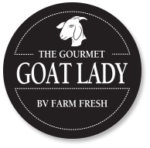Australia is the world’s largest goat meat exporter, despite the fact that we only account for around one percent of global goat meat production. While goat meat is eaten widely in many other parts of the world and is highly nutritious, here in Australia, it’s still seen as a “niche” product that’s mostly consumed by certain ethnic communities.
Unlike other red meats, goat meat doesn’t fall under Meat Standards Australia – a grading system developed by the Australian red meat industry to improve the eating quality and consistency of beef and lamb. With beef and lamb, consumers have a huge range of choices – grass-fed, grain-fed, certified organic and premium breeds such as Angus and Wagyu, not to mention an enormous variety of cuts and endless advice on how to cook with each one. If you want to buy goat meat in Australia, that’s usually all you can ask for – which means that you can end up with almost anything, and not have any idea what to do with it.

“No one would suggest that a lamb shank would be put on a barbecue; it’s not the right way to cook it,” says Jo Stewart, the woman behind The Gourmet Goat Lady, which was recently named a state winner in the 2021 delicious. produce awards. “But unfortunately, if you buy goat that’s the wrong cut and you cook it the wrong way, it’ll be tough. And when that happens, then people will think, ‘I’m never buying that again’.
“If you get a bad steak, you might think that the chef had messed up or that you must have done something wrong, but you’ll still go back and you’ll buy it again. If you have a bad experience with goat meat, there’s people who will never touch it again. And what’s more, they’ll be very vocal about telling everybody else how disgusting it is.”

Bucking the trend
The general consensus in the industry is that consumers aren’t interested in goat meat, or a goat meat grading system, but Jo claims that in her experience, this is not the case.
“For the people that are our customers, that’s not correct,” she says. “The domestic market is growing – we can’t keep up supply for orders we get from NSW alone. There are people in Australia who want a better quality of goat meat. People want that consistency – this is what cut you should buy, this is how you cook it, this is what it should taste like.”
Much of the goat meat produced in Australia comes from feral or “free-roaming rangeland” goats, which are viewed as pests in many parts of the country. This is likely another reason why many Australians avoid goat meat. But Jo and her husband Craig are among a growing number of Australian farmers who are producing high-quality, specialist goat meat breeds.

Consistency is key
Jo and Craig consulted a business advisor, who suggested they become specialist goat meat producers. With support from Meat & Livestock Australia, The Gourmet Goat Lady brand was created. And the response from the food industry was overwhelming.
“Our first sale was to a restaurant in Coogee [NSW],” Jo recalls. “I visited them a while later when I was making some deliveries in the area, and the chef told me it was the best goat they had ever, ever used – could they have some more?”
Gourmet Goat Lady products soon began winning awards – including 12 Sydney Royal Fine Food Show medals and gold at the 2017 Australian Food Awards, as well as 2019 and 2021 delicious. produce awards. The Gourmet Goat Lady now supplies leading provedores, restaurants, cafes and retailers across NSW. A key factor in this ongoing and growing success is the Stewarts’ unwavering commitment to quality and consistency.
“We will not sell anything unless we’re confident that it’s the right quality – you’ve got to have that consistency of product coming every time,” Jo says. “It’s made our business slower to progress, but we wanted to be the most reliable supplier of the best goat meat in Australia. It has to be to that quality; that’s the most important thing.”
Growing the industry
The Gourmet Goat Lady now wants to encourage others to get into goats, and to help build a stronger domestic market. The Stewarts recently hosted a field day at their property to provide information for those interested in producing goats, as well as those already in the industry who wanted to know more about implementing best practice.
“We hosted the event for the benefit of the industry,” Jo says. “It’s a fledgling industry but it’s got amazing potential, especially if we all work together.
“We’d like to see the industry progress so that farmed goat meat sits alongside lamb, and is on same trajectory as it, so Australian consumers will include goat meat in their weekly meal plans. As I like to say, there’s more to goat meat than curry.

This article first appeared on eativitynews.com.au

